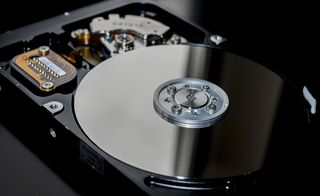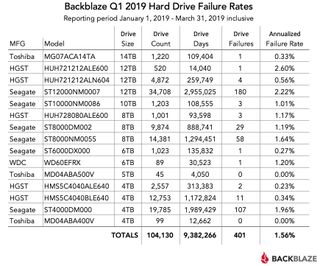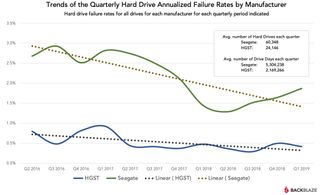This hard drive reliability report highlights why it’s important to back up your data
A cloud backup firm analyzed over 100,000 hard drives.

The latest hard drive reliability report from Backblaze, a cloud backup company that routinely publicizes failure rates among the drives in its employ, noted some interesting trends in the first quarter. For one, HDD failures as a whole have gone up. At the same time, the reports shows that larger capacity HDDs in the range of 8TB to 14TB are no more prone to failure than smaller capacity drives.
That's encouraging news if you want to trust your data to a single, big capacity HDD. Not that you should do that, of course. One of the prevailing thoughts is that it is better to spread your data out over multiple smaller capacity HDDs than one large drive. The latter is akin to putting all of your eggs in one basket, and if that basket breaks, there go your eggs.
Backblaze's latest report doesn't dispel that notion, though it does at least show that capacious HDDs are not failing left and right. Have a look:

A cursory glance shows that Toshiba manufactures the two drive models (4TB and 5TB) with zero failures in the first quarter, but "neither has a large enough number of drive bays to be statistically significant." Nevertheless, you have to go back to the second quarter of 2016 to find the last Toshiba 5TB drive to have failed, for whatever that is worth.
What's of more interest is the data for drive models that are used in higher numbers. The two most widely used drives belong to Seagate and include a 12TB model with a 2.22 percent failure rate (out of 34,708 drives), and a 4TB model with a 1.96 percent failure rate (out of 19,786 drives).
Those are actually some of the highest failure rates of the bunch, though not the highest—that distinction belongs to a 12TB model from HGST (HUH721212ALE600), with a 2.6 percent failure rate.
That's still a relatively low failure rate, though it's a bit concerning, given the small sample size. Overall, the 15 drive models used in the first quarter collectively averaged a 1.56 failure rate. How does that compare to previous reports?
The biggest gaming news, reviews and hardware deals
Keep up to date with the most important stories and the best deals, as picked by the PC Gamer team.
"That’s as high as the quarterly rate has been since Q4 2017 and it's part of an overall upward trend we’ve seen in the quarterly failure rates over the last few quarters," Backblaze said.
If digging deeper into the data, we see that higher capacity drives held their own with annualized failure rates in the neighborhood of 1 percent, give or take in either direction depending on the specific model.
One other thing that is interesting is the trend for for HDDs from Seagate and HGST. Drives from both manufacturers have been seen a downward trend in annualized failure rates over the past three years. Here's another graph to look at:

Notably, Seagate's failure rate has dropped 50 percent at Backblaze over the past several years, though has been trending upward over the previous three quarters. Backblaze doesn't have an explanation for this, at least not yet.
"We'll take a look at this and let you know if we find anything interesting in a future post," Backblaze said.
So what does all this mean? Well, for one, continue to back up your data, and make multiple back ups of anything that is mission critical or otherwise too precious to lose. For that kind of data, it's also a good idea to keep at least one of those backups off site, in case of a fire, flood, or some other catastrophe.
Provided you do that, it's generally safe to use a larger capacity HDD, if that's where you are leaning, based on Backblaze's data. For the most part, HDD's that are 8TB or higher appear only slightly more failure prone than lower capacity drives.
Paul has been playing PC games and raking his knuckles on computer hardware since the Commodore 64. He does not have any tattoos, but thinks it would be cool to get one that reads LOAD"*",8,1. In his off time, he rides motorcycles and wrestles alligators (only one of those is true).
Most Popular







